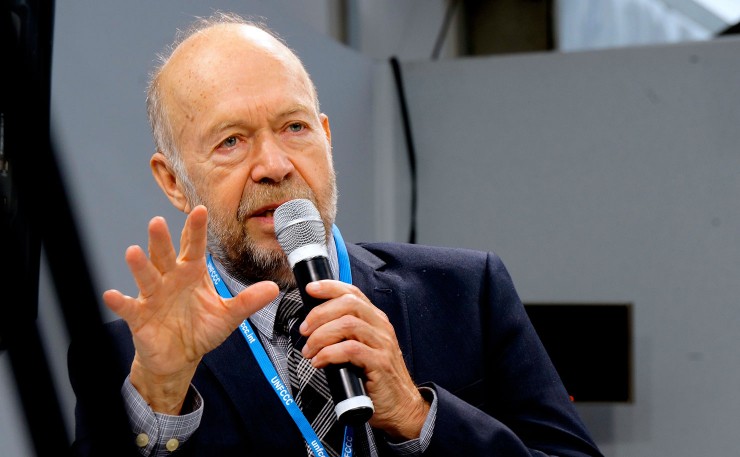The renowned climate scientist told New Matilda today future generations are “screwed” if we continue to emit carbon dioxide, at an event where some of the world’s top climate scientists endorse nuclear as a key part of the solution. Thom Mitchell reports from Paris.
A panel of eminent scientists – including James Hansen, the former head of NASA’s Goddard Institute for Space Studies and a man dubbed ‘the Father of Climate Change’ – has called on governments and environmentalists to accept nuclear energy as part of the solution to the climate crisis, at a side event to global negotiations that got underway in Paris this week.
They told media the two degree target that negotiators involved in the United Nations talks are aiming for is based on politics, not science, and the world needs to use every means available to curb emissions.
Renewable energy like wind and solar, they said, would not be enough alone.
“I think all of us here [on the panel]feel that carbon dioxide emissions are dangerous and that there’s no emissions which are acceptable, and we need to be stopping all carbon dioxide emissions,” said Dr Ken Caldeira of the Carnegie Institution for Science.
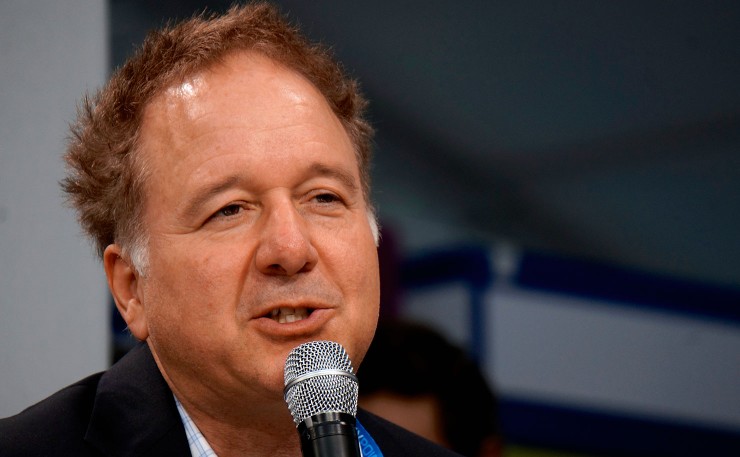
“I’ve likened it to mugging little old ladies,” he said. “You say, ‘Okay what should our target be for the rate of mugging little old ladies’? And you say, ‘Oh, well the target should be zero’. And that doesn’t mean necessarily we’re going to get there tomorrow, but it means that every mugging of a little old lady is a bad thing, and every carbon dioxide emission is a bad thing, and the target is zero,” Dr Caldeira said.
A decorated Australian climate scientist with the University of Adelaide, Dr Tom Wigley stressed the scientists were “not promoting nuclear energy” but rather “a level playing field”.
“We’re asking everybody to make sure that because this is such a demanding, challenging problem, we can’t close the door to any type of technology,” he said.
“We have to give a fair and balanced assessment, eschewing ideology and preconceptions to decide on what the energy strategy should be.”
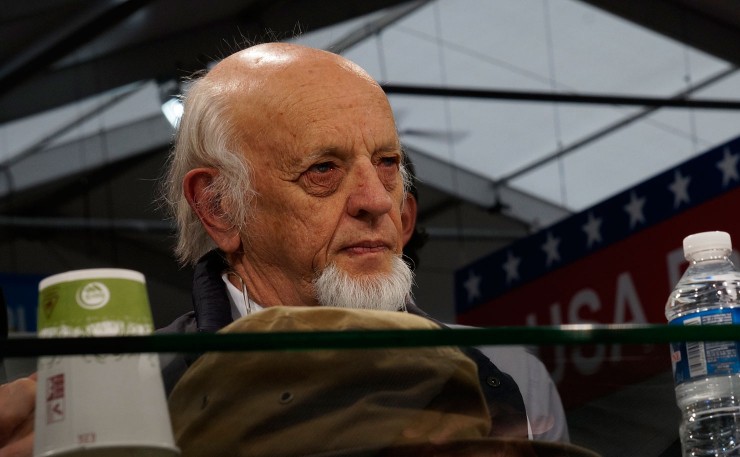
Hansen relayed an anecdote – and the thoughts of his young grandson – to highlight what he sees as the blinkered thinking around the “tremendous intergenerational injustice” of climate change and how it’s been exacerbated by blinkered thinking on nuclear energy.
“One of the things that he concluded was, you know, ‘grown-ups are scared of nuclear power’, but he says ‘they should be scared of climate change’,” Hansen said. “We know that using fossil fuels is not safe, it is very dangerous, and we have to face the fact that this danger of fossil fuels is staring us in the face.
“It’s absolutely one hundred per cent certain that we’ve got a very dangerous situation. And for us to say ‘Oh we’re not going to use all the tools that we have to try to solve it’ is crazy,” Hansen said. “We have to use all of the things that we have at our disposal and clearly nuclear power, next generation nuclear power especially, has tremendous potential to be a big part of the solution.”
Professor Kerry Emanuel – probably the panelist most skeptical of what’s usually called renewable energy, wind and solar – said that using those technologies “we can get to 30 per cent, and then you hit a brick wall”.
“You cannot power the world on renewables, you can’t do it unless there’s a miracle,” he said.
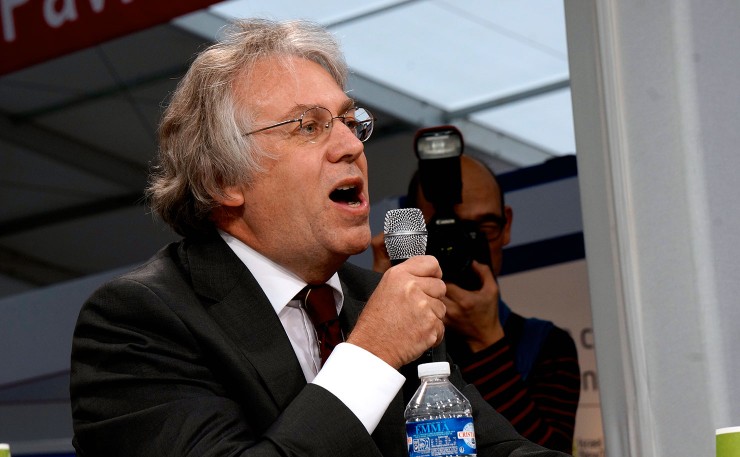
Hansen argued that concerns over the capability of renewables to act as a full substitute for fossil fuels were common to “by far the majority of scientists” he’d spoken to, and that most “agree that nuclear needs to be part of the solution”.
“But when you stand up and say that, there’s an anti-nuclear community, which I would characterise as quasi-religious,” he said, “which just hammers you and you have to spend a lot of your time trying to deal with that”.
Hansen said that new generations of nuclear technology, which burn around 99 per cent of radioactive fuel, and therefore produce almost no waste, are “within 5 or 10 year [away]if we give it priority,” but that nuclear power already has a proven track record.
“If you look at France, for example, it has most of its electricity from nuclear power and if you compare the electricity price in France and Germany, it’s about half in France what it is in Germany,” he said.
“That’s of course an old technology that France is using, but if you look at Sweden, for example, they have carbon-free electricity: That’s the solution to the climate problem.
“If we have carbon free electricity in all countries, we’ve solved the problem, because we can make liquid fuels for transportation from energy if you have abundant carbon-free electricity.
“And the way Sweden did it was build nuclear power plants [in 10 years], and combine that with hydropower; so renewable energy plus nuclear energy provides them carbon-free electricity, and that’s what we need,” Hansen said.
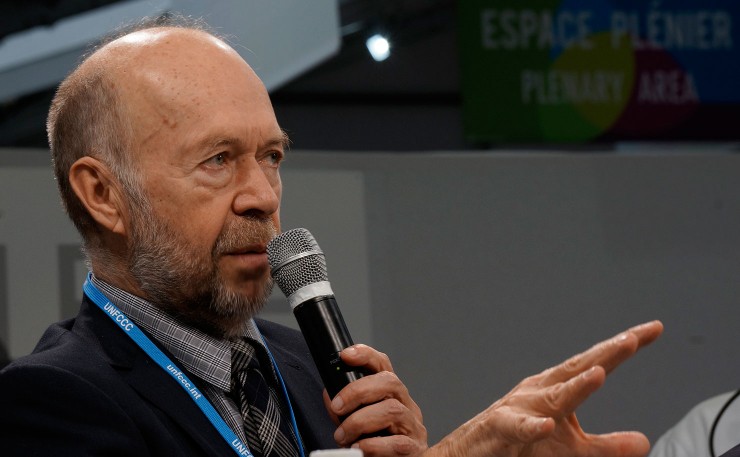
The celebrated climate scientist, famous for sounding the alarm and bringing the issue to public attention through evidence he presented to the United States Congress in the late 1980s, said the crucial next step which should receive far more funding is to “come up with designs that can be built rapidly, and that’s what’s going to happen in China”.
“My hope, to be very frank, is the fact that Chinese leaders are technically trained and they’re rational and they have very strong motives for wanting to move to clean energy,” he said.
“Their air pollution is so bad that the public is on the verge of uprising, so they have a very strong reason for wanting to move to clean energies and they’re doing as much as they can with solar, with wind, and with nuclear.
“I think that what we’re going to see is that they will develop nuclear that they can build rapidly and we, the West, should be working with them to make sure it’s as safe as possible.
“That’s our responsibility because we burned their fare share of the global carbon budget: We’ve now basically used up the amount of the carbon budget that we can afford to put in the atmosphere, so now we’ve got to find clean energies.”
Donate To New Matilda
New Matilda is a small, independent media outlet. We survive through reader contributions, and never losing a lawsuit. If you got something from this article, giving something back helps us to continue speaking truth to power. Every little bit counts.

